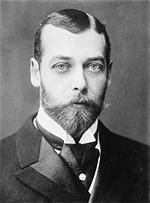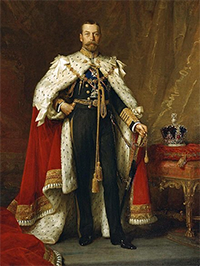The Parliament Act 1911
George V was King of the United Kingdom for 26 years in the early 20th Century. He led his realm through World War I and other trying times. 
He was born June 3, 1865, at Marlborough House in London. His father was the Prince of Wales, who in 1901 became King Edward VII, and his mother was Alexandra of Denmark. On the throne when young George was born was his grandmother, Queen Victoria. George was the second son born to Edward and Alexandra. Their first, Albert, died of pneumonia in 1892. Albert's fiancee, Princess Victoria Mary of Teck, married George. They eventually had six children, including two future monarchs. Also in 1892, George left his career in the Royal Navy, in which he had served since he was 18, in order to more effectively serve as the second in line to the throne. Victoria died in 1901, and Edward became king. George became Duke of Cornwall. He was already Duke of York and came to be known as the Duke of Cornwall and York. He and his wife went on a tour of the British Empire, visiting Australia, Canada, Ceylon, Gibraltar, Malta, Mauritius, New Zealand, Singapore, and South Africa. George was in Australia to open the first session of the Australian Parliament. After he returned home, he was made Prince of Wales. 
King Edward died in 1910, and George took the throne. He was crowned on June 22, 1911 at Westminster Abbey. One of the new king's first big challenges was the constitutional crisis that had arisen from the "People's Budget" of 1909. The House of Commons had approved the budget, but the House of Lords had rejected it. King Edward had refused to voice his approval of an increase in the number of Members of Parliament in order to pass the 1909 "People's Budget," which called for a suite of taxes on the rich in order to finance a spate of social welfare programs. Prime Minister H.H. Asquith had urged King Edward to swell the Liberal members of the House of Lords such that that body would then have a majority who were in favor of the new budget. Edward refused, saying that such an issue should be decided by the people directly, by way of a general election. The issue continued because the ensuing election didn't provide enough change in parliamentary membership to make a difference. Finally breaking the deadlock was a bill that changed the power of the House of Lords to outright veto a bill that the Commons had passed and instead gave the Lords the right to delay passage of such a bill for a maximum of two years. By the time the issue was resolved, Edward had died and George was king. George sorted things out by agreeing to do what Edward had not, create new members of the House of Lords who would approve the "People's Budget." As it turned out, the king didn't have to take that extraordinary step because the Lords agreed to a new version of the budget bill and, further, to the Parliament Act 1911, which curtailed its power. The king was very fond of stamp collecting; he has appeared on many stamps issued by a handful of countries. He also enjoyed hunting. George was king throughout World War I. He made hundreds of visits to the factories, dockyards, and hospitals that made the war effort go. He also spent time with troops on the front line. Through various royal marriages, he was related to most of the European monarchs of the time. Also during the war, George changed the name of his family. Because of anti-German sentiment, George in 1917 changed the family name from Saxe-Coburg-Gotha to Windsor. A period of unrest in Ireland peaked in 1916, with the Easter Rising in Dublin. Hard fighting took place in cities around Ireland, and Parliament made hard decisions, resulting in the creation of the Irish Free State in 1922. The six northern countries remained in the U.K. as Northern Ireland. The U.K. became one of the first countries to grant women the vote. This was part of the Reform Act of 1918. The following year, Lady Astor became the first female MP to sit in the House of Commons. The king showed tremendous political ability during the Great Depression by convincing the three main political parties to join together. Leading the coalition government was Ramsay MacDonald, who had been the first Prime Minister of the new Labour Party in 1924. King George had also cautioned restraint when the government of Stanley Baldwin was prepared to greet the General Strike of 1926 with a heavy hand. In 1931 came a seismic shift on constitutional decision-making. The Statute of Westminster gave parliaments of other countries that were still part of the U.K. dominion the ability to pass laws without regard for the laws of the U.K. George in 1932 gave a royal address at Christmas. Subsequent monarchs have continued this tradition. The king had suffered serious injuries following a fall from a horse in 1915. A heavy smoker, he contracted a lung disease in 1925. He died on Jan. 20, 1936. Succeeding him as king was his oldest son, Edward. |
|
Social Studies for Kids
copyright 2002–2026
David White




